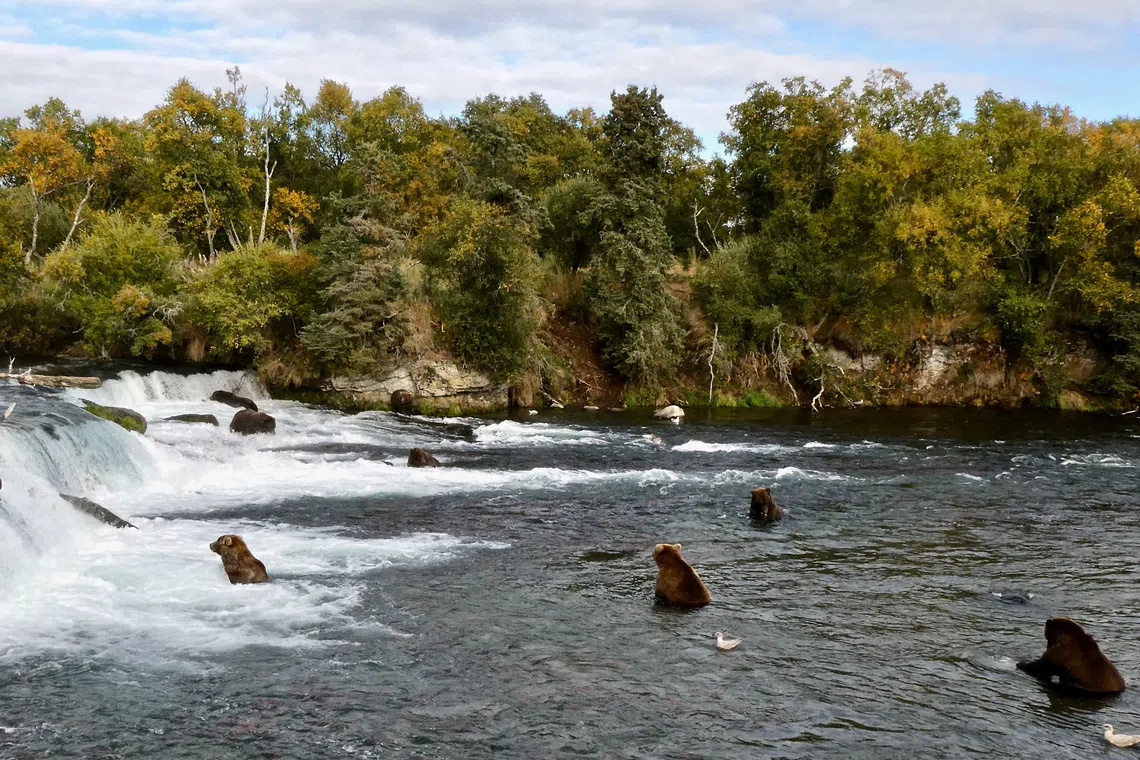Alaska sued over aerial hunting of bears to protect caribou
Sign up now: Get ST's newsletters delivered to your inbox

State wildlife officials have denied that their efforts to protect the caribou endanger bear populations.
PHOTO: REUTERS
Follow topic:
ANCHORAGE – Environmental groups sued Alaska’s wildlife authorities on Nov 10, seeking to halt a predator control plan that lets game wardens hunt down unlimited numbers of bears from helicopters over a vast area roamed by a protected caribou herd.
The groups accuse the Board of Game of reinstating the programme without adequately accounting for how it will affect grizzly and black bear populations, violating wildlife conservation provisions of Alaska’s constitution.
Their suit, filed in state district court in Anchorage, said state fish and game agents killed 175 grizzlies and five black bears since 2023, under two earlier versions of the programme struck down by courts.
State wildlife officials have denied that their efforts to protect the caribou endanger bear populations.
“We are trying to rebuild the caribou herd, but we’re not going to jeopardise long-term sustainability of bears in doing so,” state Fish and Game Commissioner Douglas Vincent-Lang said in a statement when the new regulations were approved in July.
Lawsuit seeks to block aerial bear hunting
The lawsuit on Nov 7 was brought by the Centre for Biological Diversity and the Alaska Wildlife Alliance against Mr Vincent-Lang, along with the Alaska Department of Fish and Game and its policy-setting Board of Game.
The plaintiffs are seeking a court order blocking a renewal of aerial bear hunting before its next round in the spring of 2026, with the arrival of caribou calving season and the emergence of mother bears from dens with newborn cubs.
The programme was designed to curb bear predation that state wildlife officials blame for diminishing the Mulchatna caribou population and thwarting herd recovery efforts.
The herd is now estimated at fewer than 15,000, well below a goal of 30,000 to 80,000 deemed necessary to ensure numbers sufficient for traditional hunting and subsistence purposes.
The number of bears in the region is less clear, said the lawsuit, citing a potential range between 2,000 and 7,000 grizzlies it says the department has estimated for south-western Alaska as a whole, based on outdated studies.
The department gave no black bear population estimates, it said.
Groups say bear control approach is misguided
Environmental groups said the bear-control programme reflects a misguided approach that has long maximised protection of big-game species at the expense of bears and other predators needed for a healthy balance in the ecosystem.
“The Department of Fish and Game wants to turn Alaska into a game farm and treat bears and wolves as disposable,” said Mr Cooper Freeman, the Alaska director of the Centre for Biological Diversity.
Contrary to state wildlife officials’ assertions that bear preying on caribou calves are the biggest threat to herd recovery, Mr Freeman said disease and lack of food resources worsened by climate change were key factors in their decline.
State officials also say the bear control programme focused on an area of about 3,100 sq km, but environmentalists say the predator control plan applies to 104,000 sq km adjoining wildlife refuges. REUTERS

